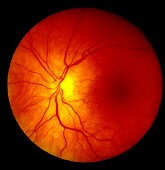Provokes acute ocular inflammation, dilation, permeability of choroidal vessels
MONDAY, July 27, 2015 (HealthDay News) — Local degranulation of mast cells is associated with acute ocular inflammation, dilation, increased vascular permeability of choroidal vessels, and serous retinal detachments (SRDs), according to a study published online July 23 in The American Journal of Pathology.
To characterize the consequences of mast cell degranulation on ocular pathology, Elodie Bousquet, M.D., from the University of Paris Descartes, and colleagues induced mast cell degranulation by local subconjunctival injection of compound 48/80 in rats.
The researchers observed initial degranulation of mast cells in the choroid 15 minutes after injection, which increased up to three hours after injection. Mast cell degranulation was paralleled by clinical signs of inflammation in the anterior segment. Dilation of choroidal vessels and SRDs were observed with optical coherence tomography and confirmed by histology. The rate of SRDs was reduced significantly by subconjunctival injection of disodium cromoglycate. There was a correlation between the infiltration of polymorphonuclear and macrophage cells and increased ocular media concentrations of tumor necrosis factor-α, chemokine CXC-ligand 1, interleukin (IL)-6, IL-5, chemokine ligand 2, and IL-1β. There was an opposite evolution of vascular endothelial growth factor and IL-18 concentrations.
“Mast cell degranulation could be an important factor in chronic ocular diseases and in acute ocular inflammation,” the authors write. “Pharmacologic inhibition of mast cell degranulation by inhibiting the release of inflammatory mediators could have an important therapeutic potential on retinal diseases associated with choroidal enlargement and/or SRDs.”
Copyright © 2015 HealthDay. All rights reserved.








